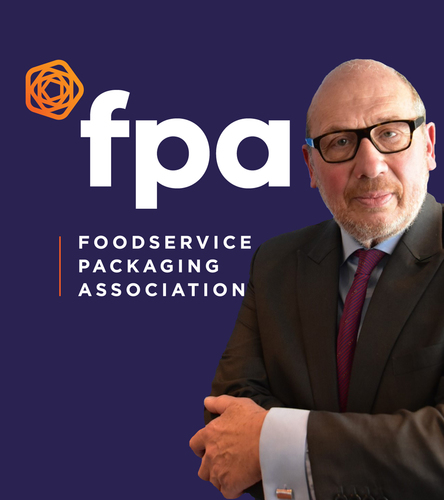The FPA issues guidance on packaging claiming to be ‘plastic-free’
The Foodservice Packaging Association (FPA) has issued guidance to address the claims made by producers of ‘plastic-free’ packaging.
In response to the big increase in foodservice packaging claiming to be plastic-free – coupled with the confusion and misunderstanding surrounding the validity of plastic-free packaging claims – the FPA has published a list of requirements to help inform packing buyers conducting due diligence prior to purchase.
“Our members, foodservice retailers and the general public need clarity”, says Martin Kersh, Executive Director at the FPA. “FPA members need to know what evidence they should be seeking to validate packaging, while foodservice retailers need to be confident they are making buying decisions based on evidence that is valid in the UK.
“Having board-based packaging that can hold hot fluids, sauces and oils safely, without some form of plastic lining or coating, is a huge attraction for retailers”, Kersh continues. “However, while plastic-free packs don’t contain the polyethylene (PE) or PLA most often used to make packs effective, many do contain other plastics, such as acrylic, as part of what is known as a dispersion coating. As such, there are packs claiming to be plastic-free, which are not”.
There is much confusion regarding the certification used to evidence claims of ‘plastic-free’ and symbols used to demonstrate conformity. Some certificates are produced by organisations not recognised by the United Kingdom Accreditation Service (UKAS) – and there are other symbols which are totally fictitious and a clear breach of the Competition & Markets Authority Green Claims Code.
The FPA guidance for plastic-free packaging is summarised below:
1. Plastic-free must mean 100% plastic-free – with no intentionally added plastic present – either in the principal substrate or within the lining/coating.
2. The finished pack (not only the material it consists of) must be independently tested and certified to be 100% plastic-free by a certification body recognised by the United Kingdom Accreditation Service (UKAS).
3. The testing must identify the presence of any plastic, and not just those plastics that might be present in the packaging the ‘plastic-free’ pack is seeking to replace.
4. Certification issued by a country outside the UK does not necessarily validate a claim made in the UK. The due diligence for packaging being marketed in the UK needs to ensure the evidence/certification is accredited by UKAS.
5. The only symbols shown must be those of the UKAS-accredited certifying body, accompanied by a license number.
“The guidance for plastic-free packaging falls into the same category as that required for all other claims regarding the origin and credentials of the certifying body”, adds Kersh. “All our members are required to operate their businesses in accordance with the FPA Code of Practice, which expressly forbids the use of any unsubstantiated claims”.
A full copy of the FPA guidance can be viewed here. Businesses seeking certification can visit the United Kingdom Accreditation Service (UKAS) website to source accredited organisations. UKAS is appointed by government to assess and accredit organisations providing certification and testing facilities.
Ends
Notes to editors
Martin Kersh, Executive Director of the FPA, is available for interviews and/or further comment. Please contact Louise Holmes, FPA Media & Communications: 07909 728069 or email louise@foodservicepackaging.org.uk
About the Foodservice Packaging Association (FPA) https://foodservicepackaging.org.uk
The Foodservice Packaging Association (FPA) is a leading trade body, representing organisations associated with the foodservice packaging industry. Its membership includes both large global companies and smaller businesses – offering a broad range of foodservice products and services – together with organisations responsible for the waste collection, processing and recycling of foodservice packaging.
The FPA upholds the interests of its members when meeting with UK government, the devolved administrations, NGOs and other trade associations. Its executives sit on a number of steering groups, including: the DRS industry working group; the HMRC industry working group for the plastics tax; and the steering group for overall Defra reforms.
The FPA’s mission is to showcase innovation and provide a unified voice to advance and promote the foodservice packaging industry through advocacy and education. The annual FPA Exhibition and Awards celebrate members’ achievements and innovations; FPA Environment Seminars bring together high-level speakers from governments, industry and academia – allowing members to engage directly with policy makers and thought leaders; and the FPA’s weekly Digest disseminates complex issues, translating them into plain English to keep members informed of recent and upcoming legislation; environmental and sustainable issues; and the views and activities of relevant NGOs and other sector bodies.
The FPA is committed to promoting sustainable practices and responsible stewardship of the environment. All FPA members undertake to comply with the FPA Code of Practice, confirming that their organisations operate to the highest standards.
This press release was distributed by ResponseSource Press Release Wire on behalf of Foodservice Packaging Association (FPA) in the following categories: Environment & Nature, Food & Drink, for more information visit https://pressreleasewire.responsesource.com/about.
